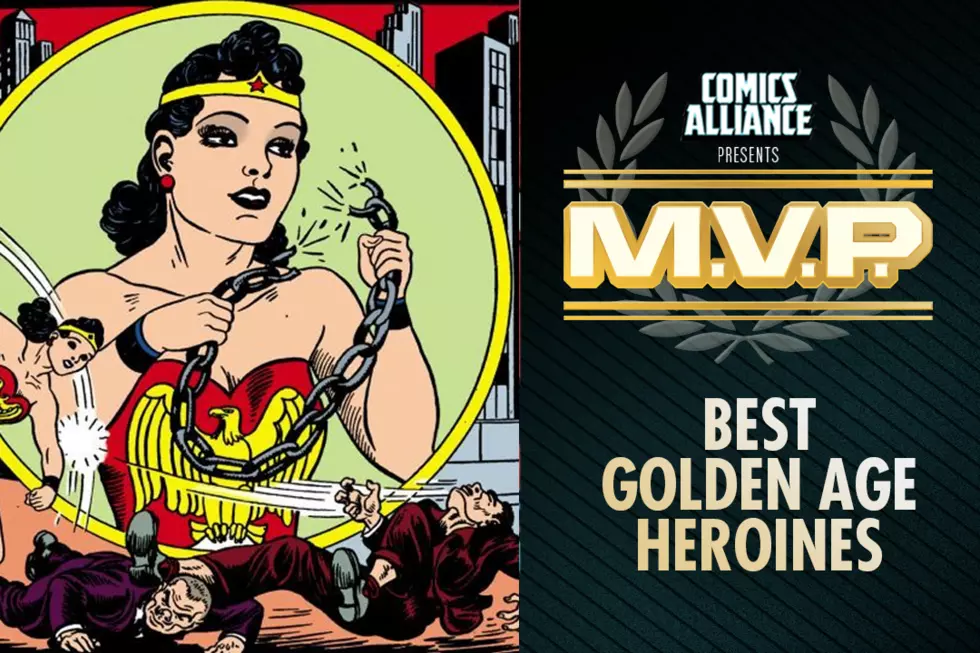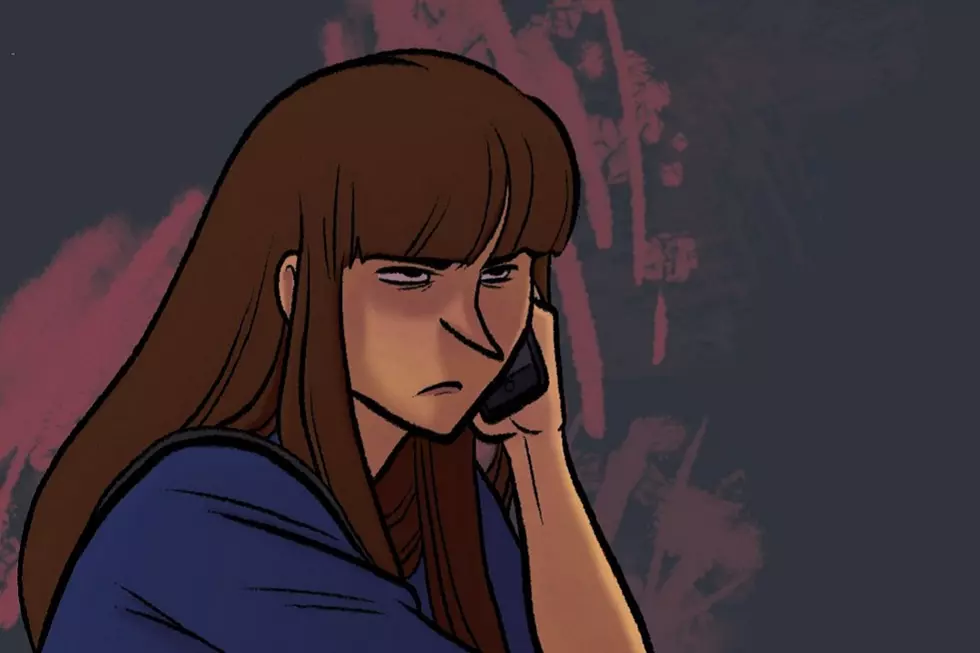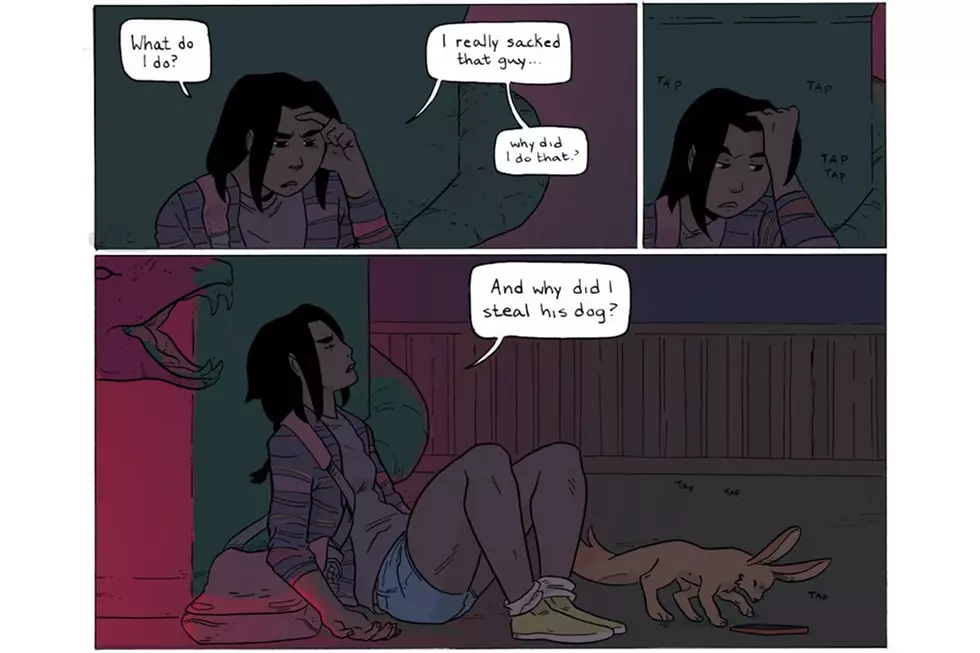
Girl Comics #2 Cover Debut – EXCLUSIVE
ComicsAlliance is pleased to give you the first look at the cover of "Girl Comics" #2, illustrated by "Sandman" and "Beasts of Burden" artist Jill Thompson, who says the Snow White-themed superheroine cover was inspired by her love of fairy tales and fantasy, and a particular affection for Kitty Pryde. "Talk about having someone to identify with as a teen," said Thompson. "A curly-haired girl from a suburb of Chicago... Wait! I'm a curly-haired girl who grew up in a suburb of Chicago! It was love at first read."
The second installment of the all-female edited, written, illustrated and lettered Marvel comics anthology is due out in April, and will also include a fully painted interior story by Thompson.
It's worth noting that since the announcement of the series on The Beat a couple weeks ago, both the title and the concept of the anthology have sparked criticism from some feminist fans and bloggers over whether an anthology collection specifically spotlighting the work of female creators was marginalizing them, rather than promoting them.
I asked Jeanine Schaefer, one of the editors of "Girl Comics," about her perspective on the blogosphere reaction to the series, why she thinks the project has received such a wide array of responses from both men and women, and why the title itself -- and its use of the word "girl" -- prompted such strong reactions."I think the name is polarizing for two reasons," said Schaefer. "One, because in order to talk about women in comics you more often than not have to make one gender the 'other,' and inevitably someone feels misrepresented. Two, because 'girl' is a bomb of a word that for many women has been wielded against them to cause a lot of damage both mentally and professionally, and people seem to be unsure if this is another case of the weaponized word or not."
And while "Girl Comics" may have sparked some heated arguments, Schaefer sees this as something productive, and a way to help start conversations about gender that many people want and need to have. "I'm finding the reactions to it a step forward in the dialogue about women in mainstream comics. Because it's encouraging people, both men and women, to confront things that they might be uncomfortable with, to engage in conversation about the sexism in comics that is still lingering, and to celebrate the ways in which it's getting better."

A lot of the defensiveness of female fans no doubt comes from the fact that superhero comics really are overwhelmingly dominated by both male readers and male creators, and the fact that the genre has historically made little effort to appeal to women -- or even, at times, to not overtly alienate them. And while things have improved significantly -- and I see Marvel Women as a sign of that improvement -- there's still a pervasive feeling of frustration and marginalization felt by many female superhero fans, something perhaps best summed up by the "if you don't like them, don't read them" reply I've heard countless times from both fans and high profile members of the industry to sincere criticisms about female characters from lady fans who care about superhero books.
Still, I can't help but find the feminist negativity a little surprising, particularly in response to an enormous mainstream push by Marvel Comics to address the gender gap by highlighting the work of exceptional female creators and giving them a bigger podium in the genre than many of them would have had otherwise. Yes, if the anthology was genuinely the only place where we could find the work of women at Marvel, that would obviously be problematic, but at a time when there are more women working in the genre than ever, it's sad that the first impulse is to see this project as something limiting.
Heidi MacDonald collected several quotes from "Girl Comics" creators saying pretty much that, and also posted a comprehensive list of all the other great work done by the women in the anthology, much of it involving superheroes. And yes, it would be great to have more women get their own ongoing series at Marvel, but giving them this kind of high-profile attention and mainstream comics exposure isn't exactly going to hurt anybody's chances. It's also worth noting that Marvel announced 2010 as the Year of Marvel Women, not the Year of That One Anthology With Women, and so there is likely more to come.

Personally, the most disappointing part about all this is that when "Girl Comics" presented an ideal opportunity for the online world of comics commentary to focus on the work of amazing creators like Colleen Coover, Kathryn Immonen, Carla Speed McNeil, Ann Nocenti, Nikki Cook, et al, it ended up starting a flamewar about gender issues instead, which in my mind reduced those creators to nothing more than their gender far more than the anthology ever did.
Fortunately, the positive responses I've seen from fans are doing exactly the opposite; the people who are excited about "Girl Comics" aren't chomping at the bit to buy a comic with some nebulous gender theme; they're excited because they love this creator, or that creator, and can't wait to see more of her work. Some of the women on that list are actually my favorite creators ever, not because they're women but because they are awesome, and I am thrilled to see them getting more exposure.
There are battles worth fighting and complaints worth registering about where superhero comics goes wrong when it comes to women, and I've certainly done my fair share of that. But when something positive happens -- even if the name isn't perfect, or even if you're still gun-shy and suspicious of the industry as a whole -- I think it's still important to stop for a moment and recognize what the anthology was intended to recognize: namely, these creators, and how goddamn impressive they are. Here on ComicsAlliance, at least, we'll be doing exactly that over the coming months, so stay tuned.
More From ComicsAlliance
![When Everything Is Pink, Nothing Is Pink: Sarah Stern On Color And Creativity [Interview]](http://townsquare.media/site/622/files/2017/03/Cindersong-feat.jpg?w=980&q=75)









